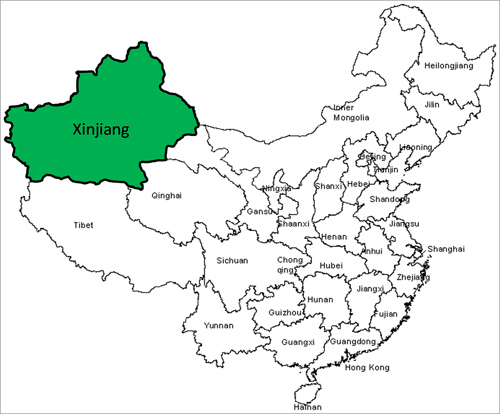The Plight of the Uighur People

The province of Xinjiang.
For thousands of years, the Uighur people have been at the center of conflict and action. Their home, the Chinese province of Xinjiang, lies at the crossroads of the ancient Silk Road, where the Middle East meets up with Western China, and where many merchants and explorers have sought their fortune for centuries. However, the nearly eleven million Uighur people today live under an extremely oppressive regime, that is bent on erasing all traces of rebellion, dissent, and pride from all corners of the land.
The area where the Uighurs call home has been a part of many different empires for several millennia, but joined the recent Chinese canon during the late 18th century when it was conquered by the Qing Dynasty. When the Qing Dynasty dissolved in 1912, the region fell into semi-independent warlord states until in 1949 it was reunited as the East Turkestan Republic. However, independence would be short lived, and Xinjiang was once again absorbed back into China, this time under the rule of the Chinese Communist Party. Xinjiang is technically an “autonomous region” of China, much like Tibet to the south. However, also like Tibet, Xinjiang’s autonomy is more of a superficial label and the Chinese government is heavily involved in the daily lives of the Uighurs.
Ever since 1949, the Uighur people have fought hard to regain their sovereignty. Uighurs are more closely related to Central Asian territories, and the language they speak is a descendant of Turkish. Along with this, the majority of the Uighur population is Muslim, and their culture reflects this. Many Uighurs have a hard time living with Chinese rule, and numerous separatist groups have sprung up to rally the cry for independence. Uighur separatist attacks have included stabbings, gunfire, and a car fire in Beijing’s Tiananmen Square.
The Chinese government has used the violence, and the fear of terrorism in a post-9/11 world to justify further security crackdowns in Xinjiang in an attempt to squash all calls for freedom. The Chinese regime routinely makes mass arrests and frequently persecutes Uighurs unfairly. Even high profile Uighur academics, such as university scholar Ilham Tohti, are rounded up and accused of inciting violence and secession from China.
Much of the oppression and violence between the Uighurs and the Chinese can be attributed to ethnic tensions between the two races. Uighurs don’t think of themselves as Chinese, and therefore don’t want to be a part of China. The Han Chinese see the Uighurs as troublesome rebels, and associate that with their Turkish-Muslim culture. In an attempt to suppress this, the ruling Chinese have enacted laws discriminatory laws, such as prohibiting Uighurs from fasting during Ramadan and limiting the number of mosques that can be built (BBC). The Chinese Communist Party are even encouraging the mass migration of the Han Chinese ethnic group out west to Xinjiang in hopes of completely wiping out the dominant Uighur culture by making it a small minority. This has also been China’s policy in Tibet and it has worked for the most part.
Living as an Uighur is almost exactly like living in a dystopian police state. Xinjiang’s newest Communist Party leader, Chen Quanguo, has ramped up the oppression by increasing the police force, adding checkpoints, and having constant surveillance everywhere. Everything is monitored, and even the cars have tracking devices on them. The Chinese government hopes this approach will once and for all quiet the Uighur population so that it may exploit the region for natural resources without any resistance.
Many other autonomous regions of China, such as Hong Kong and Taiwan (Taiwan maintains it is an independent state, but the US technically hasn’t recognize it as such since Nixon’s warming of relations with China in the 1970’s) are worried that this strategy that the Chinese regime has enacted will spell disaster for them. They have enjoyed relative freedom since the modernizations after the death of Mao, but these tactics harken back to the days of the Cultural Revolution and of the Communist dictatorship. Only time may tell whether or not the Uighur people will finally achieve their independence, or the rest of China will face a similar situation of government oppression.